Welcome back to another week of Teaching Kids About Character: An Alphabetic Blogging Series. This week’s topic is Y for (being) YourSELF! and it’s all about what we can do as parents to encourage our kids to develop healthy self-esteem.
This post contains Amazon Affiliates Links. Please see our full Disclosure Policy here.
Why Worry About Self-Esteem?
Healthy self-esteem. It’s arguably one of the biggest predictors of happiness in life.
When kids develop good self-esteem, they can take the ups and downs of life with a more even keel knowing that they can feel okay with themselves regardless of their circumstances, or what others think of them.
It allows kids to stand up for themselves when being bullied, and it allows them to express their genuine thoughts and ideas (and their true selves) with others, without being afraid of rejection.
In short, it allows kids to be their true selves.
To me, encouraging a healthy sense of self-esteem in my 3 year old son, Onetime, is more important than just about everything else we’ve talked about in this Character Series. However, it is also intricately tied to many of the other traits we’ve already covered – as you’ll see!
10 Ways to Encourage Positive Self-Esteem in Kids
1. Respect FEELINGS
If we want our children to be honest with us about how they feel and what they think as they get older, and if we want them to value and trust their own feelings, we need to show them that we respect feelings right from the start.
When we ignore our kids’ feelings, or don’t allow the expression of certain ones (usually the negative ones), we are sending them a message that that part of their self is not acceptable.
What then happens is the child becomes very good at hiding away those parts of their true selves and they begin to “put on a good face” for others. This “pretend” self often leads to a feeling of being misunderstood, and lonely.
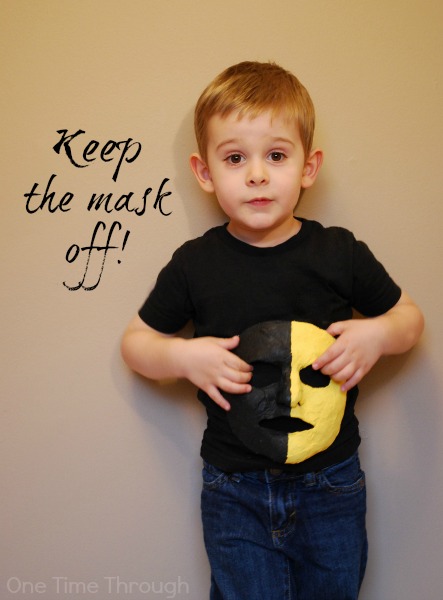
, on how to acknowledge your child’s feelings. It’s not difficult to learn, and it makes a huge impact!
You can also read about our experiences with acknowledging feelings here at One Time Through in the posts B is for Behaved and Cruising Towards Mellow: A Guide to Supporting Upset Kids.
2. FULFILL Our Kids’ NEEDS for Attention, Love, & Connection So They Feel VALUED
When I first started learning about the attachment parenting style after my son was born, someone gave me an analogy that has stuck in my mind ever since. It went something like this:
Children are like fruit. They do not spoil when they are taken care of and paid attention to. They spoil when they are left alone.
I know the wording sounds awkward there, but the idea has a lot of value. Basically, kids thrive on our attention and love. This is just common sense.
We can’t spoil our kids by giving them too much attention or encouragement (just ask Dr. Sears!). Instead, the more time and connection we can build with them when they are young, the happier and healthier and more emotionally safe they will feel as they grow.
Kids that feel secure in the knowledge that their needs will be met when they are young, come to develop a view of the world that it is a safe and secure place where happiness can be received.
Kids whose needs are not met regularly as children, come to view the world as an unsafe place where their needs cannot or will not be met.
Do you see how that might affect self-esteem?
For tons of ideas for fun ways to connect with your child, read our post: 30 Ways to Joyfully Connect With Your Child in 10 Minutes. You can also read 5 Ways to Connect So Your Kids FEEL Loved for more ideas.
A new favourite book of mine that provides tons of ideas for how to connect with your kids is: Playful Parenting by Lawrence J. Cohen.
Parents need to fill a child’s bucket of self-esteem so high that the rest of the world can’t poke enough holes to drain it dry. ~Alvin Price
3. Parent POSITIVELY
Kids flourish in a positive environment where mistakes are allowed, problems are approached to solve together, and everyone feels equally respected.
Have you heard about the 3 different types of parenting styles: authoritarian, permissive, and authoritative?
Authoritarian parents need to be in charge, try to constantly control their children, and punish when kids step out of line. Their motto might be, “My way or the highway!”
Permissive parents allow their kids to do whatever they want without regard for others. Kids can trample others’ rights, including parents and siblings, without consequences or follow-up.
Their motto might be, “Do whatever you want sweetie – I don’t want to stifle you!”
Authoritative parents are firm, but kind and respectful of their kids’ needs and wishes. When their kids make mistakes or hurt others, they problem solve together, set limits, and allow natural consequences.
Their motto might be, “I love and respect you and am here to guide you.”
Research has shown time and again that there are many benefits to bringing up kids in authoritative households.
To read even more about this style of parenting, check out this awesome article on the Parenting Science website. They even have a self-assessment to see where your style fits!
One Time Through‘s philosophy is democratic and all of our Character Series posts follow this style.
4. Parent UNCONDITIONALLY
According to parenting expert Alfie Kohn, author of Unconditional Parenting, parenting unconditionally means that regardless of our kids’ choices and behaviour, we show them we love and respect them at all times.
We don’t withdraw love and attention, or punish when our kids make mistakes. We problem-solve.
We don’t reward or use other bribes to try to control our kids’ behaviour. We try instead to encourage positive behaviour through coaching, modelling, and teaching our kids what we expect.
The use of both punishment and rewards, is associated with poor self-esteem in children. Kids may feel controlled and shamed by these parenting methods, and it takes a toll on how they eventually come to feel about themselves.
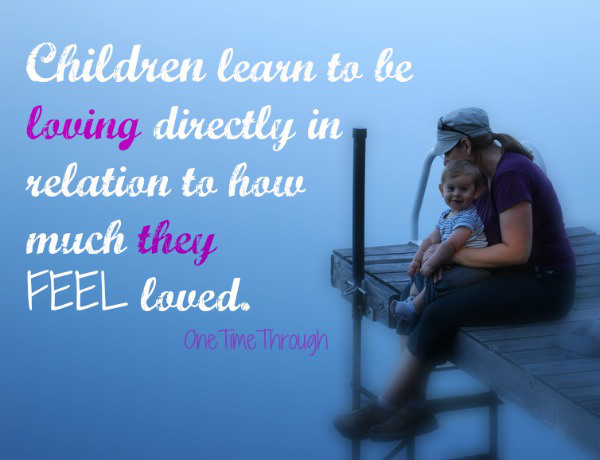
The Natural Child Project also has an excellent article on the dangers of praise and rewards, including a detailed discussion of research in this area.
For suggestions on supporting children unconditionally when they are aggressive, read Helping Aggressive Kids: 10 Positive Parenting Tips. For encouraging cooperation, check out B is for Behaved.
5. ENCOURAGE Instead of Praise
You may well be asking yourself now something like, “If punishment and praise can lower my child’s self-esteem, how do I motivate my child to behave?” The answer is positive encouragement.
By definition, praise evaluates kids. It gives a child your opinion on their behaviour and detracts from a child’s own ability to decide for themselves how or what they have done well.
Eg. “(I think) You’re awesome!”
“(I think) You’re so smart!”
“What a GOOD boy/girl.”
“(I think) That’s a great job.”
Encouragement simply describes what kids have achieved and allows the kids to praise themselves and draw conclusions. This builds self-esteem and pride.
Eg. “You cleaned up all your toys by yourself! Wow!”
Child’s likely conclusion: I can do things by myself and be responsible.
“You shared all your toys with your friend today and you took turns too.”
Child’s likely conclusion: I’m friendly and caring.
“You made your Dad very happy today when you helped him rake the leaves.”
Child’s likely conclusion: I’m caring and helpful.
6. Encourage ASSERTIVENESS
Assertiveness is directly tied to self-esteem. Kids who learn ways to solve problems assertively instead of aggressively, have more positive relationships with others.
Kids who approach life assertively, are less likely to be taken advantage of and abused. They stick up for themselves. They protect their physical and emotional boundaries and do not passively let others walk all over them.
To read more, check out our Teaching Kids About Their ASSERTIVE SUPER-POWERS post.
7. Allow Kids to Say NO and DISAGREE with You (respectfully!)
It’s not only important to respect our kids’ feelings, it’s also important to respect their THOUGHTS.
If we want our kids to be able to stick up for themselves when they are teens and adults, they need to practise doing this respectfully in a safe environment.
Teach them to disagree agreeably using words like, “I disagree. I feel that….” or “I disagree. I think that…”
Teach your kids the meaning of the word COMPROMISE and model it with them and with your partner.
To read more about why it’s so important to allow kids to say NO sometimes – read our Teaching Kids About Their Assertive SUPER-POWERS!
8. Avoid LABELLING
According to Adele Faber and Elaine Mazlish, we are doing our kids a huge disservice when we label them.
Using negative phrases like, “You’re so lazy!” are obviously harmful. But even positive labels, like, “You’re the smart one,” or “You’re such a good girl,” can also put our kids in a “box” that they feel they may not be able to leave without disappointing you, or causing conflict.
My husband and I have been reminded of this repeatedly by my son ever since he learned to say his name. Whenever we slip up and “label” him (e.g. “You’re a silly-billy, Onetime!” or “You’re so goofy!” ) he speaks up loudly and says, “No Mommy. I’m JUST Onetime!”
Nobody likes to be TOLD who they are by someone else. Let’s instead let our kids decide for themselves who they want to be, without our labels. Their self-esteem will thank us for it!
9. Respect INDIVIDUALITY
Just a quick word on individuality. Our kids, just like us, have their own likes and dislikes, sensitivities, temperaments, levels of activity, and quirks. Respecting that many of these differences are biologically determined can help us understand our kids better and parent them more sensitively.
A great site for learning about the different biologically-based differences in temperament is: The Child Development Institute.
Two of my favourite books about challenging temperaments in children are:
The Highly Sensitive Child: Helping Our Children Thrive When the World Overwhelms Them
10. Teach Them About Personal RIGHTS
One of the easiest ways to help kids develop good self-esteem is to make sure they are aware of their personal rights.
Whenever I talk with my students about bullying, we cover these rights and talk about how everyone has them. Sometimes I think this is the first time many kids have been told that their feelings and opinions matter and that they deserve to express them. I plan on making sure that my son is aware of his rights from an early age!
To that end, I created a graphic version of a Bill of Rights that is just perfect for kids (or anyone really)! Feel free to share this image or print it off to spread the information to as many parents and kids as possible.
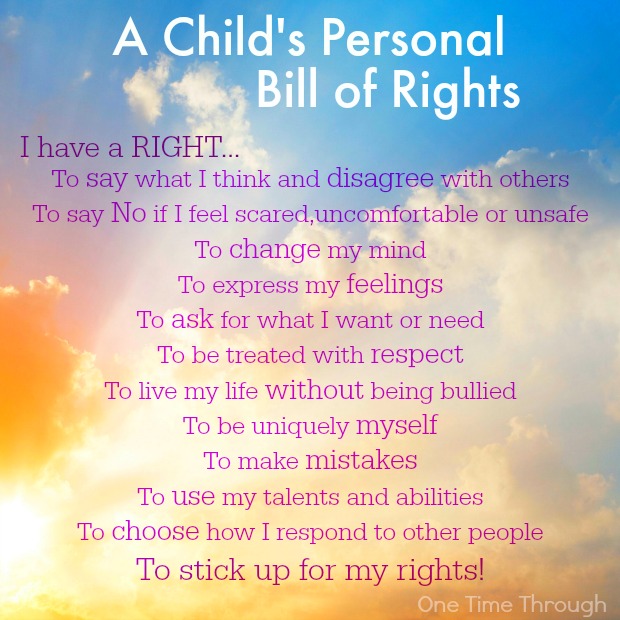
To keep following our alphabetic journey, find all our posts on the Character Series page.
Here’s to helping our kids become who they truly should be, their very best SELVES!
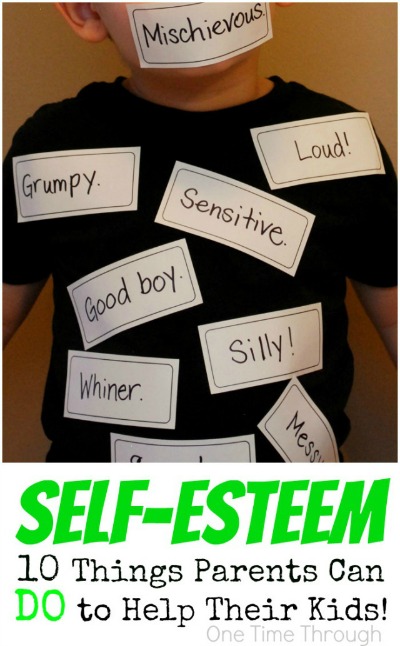
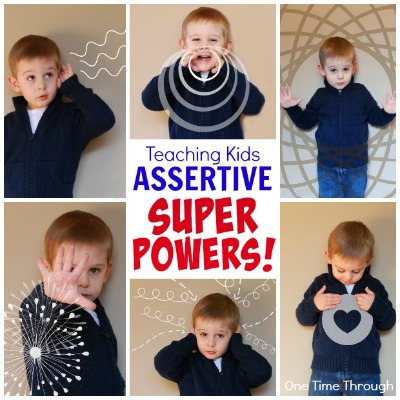


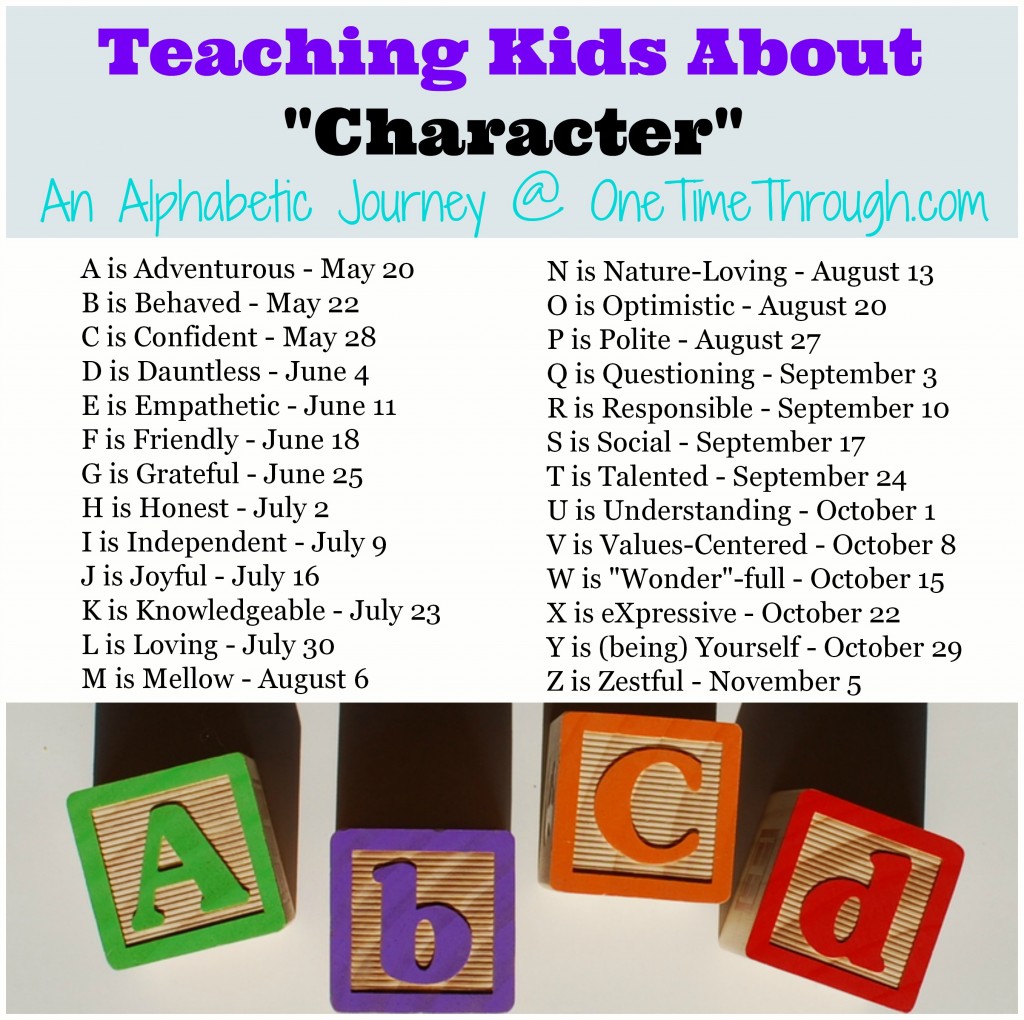
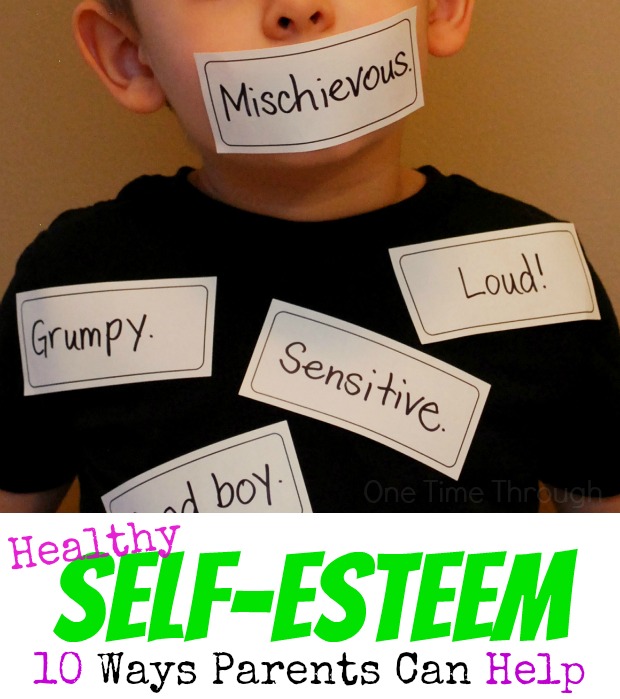
Another great post in the series Sue. I can’t believe you’re nearly at the end of your fantastic alphabet journey. What a wonderful collection of posts it will be when you’re finished. Hope you’re well 🙂
Thanks so much Lauren. I can’t believe it’s almost over either! What a journey it’s been. So much reflection and I’ve learned so much along the way. Hope things are well at your end too! Best, Sue
Hi there, I’ve just come across your website and been reading non stop! I’m also reading Faber/Mazlisch as I have a 3 year old who seems to be going through a sensitive/anxious phase. While I’m trying these techniques and they mostly seem to work to make him feel better about himself i also wonder whether my unconditional listening encourages him to focus on the negative? He really does go on and on and sometimes when he’s in a good mood bringing it all up again makes him sad. I’m just wondering if there should be limits set?
Thanks
Lilli
I’m so glad you found our site Lilli and are finding it helpful. It sounds like you’re being a wonderfully supportive and sensitive parent and doing your best to parent consciously. When you decide that it’s important to acknowledge your child’s feelings and empathize with them (even when it’s sometimes hard to hear all the negativity), it’s not always easy. When I first read Faber and Mazlish and started understanding the importance of really listening to my child, accepting his negative feelings, and allowing him to vent – I found it difficult to listen as well. It made me uncomfortable or anxious myself sometimes. And sometimes my son would “go on and on” as you describe and I felt like it would never end. I was tempted to try and distract him or coax him out of it, but I knew better. I’m not sure if you’ve heard of the book Raising Our Children, Raising Ourselves by Naomi Aldort. After reading this book, I had a better understanding of why I personally had a difficult time supporting my son when he was expressing negative emotions. It turns out it has a lot to do with how we were taught to deal with our own negative emotions when we were children. I would highly recommend this book if you feel like your situation is similar.
I’m a little unsure what you mean when you say that when he’s in a good mood – bringing it up again makes him sad. Is he bringing things up again himself? If that’s the case, usually that means he needs to talk or vent some more until he can leave that upset behind – which is totally normal and healthy – especially if he tends to be somewhat anxious or sensitive. He just needs more time to process what was bothering him, and feel really heard. Another great resource that I found really helped teach me to empathize and help my son move through negative emotions is Pam Leo’s book: Connection Parenting. From my understanding, Naomi Aldort and Pam Leo would argue that there should not be limits set on allowing the expression of emotions, as long as the child is not being aggressive. You’ve definitely chosen a parenting approach that is not a quick-fix, but research shows will pay off down the road with an emotionally healthy child. I really think that this kind of approach is especially important for sensitive children. I wish you the best of luck and feel free to write back if you like! Best, Sue